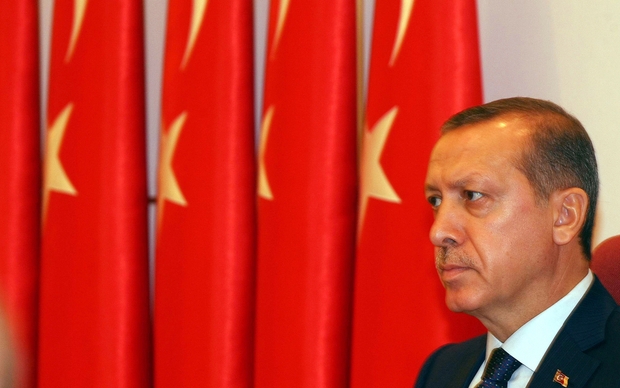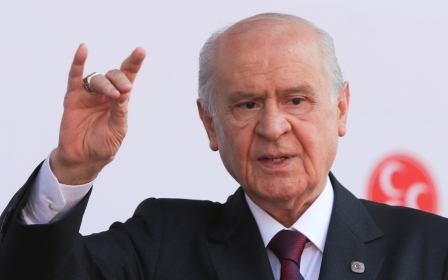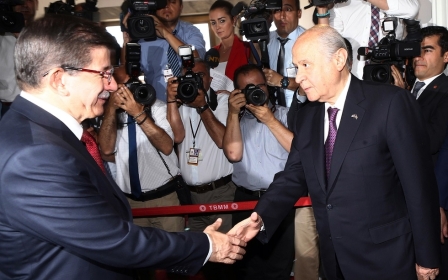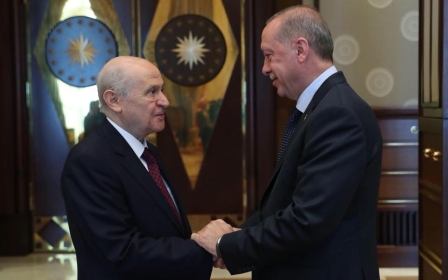Turkey: Will Erdogan’s power take hit after losing his biggest political ally?

Devlet Bahceli, leader of Turkey's ultra-nationalist MHP, said earlier this week that his party doesn't intend to set up another alliance with Turkish President Recep Tayyip Erdogan's AKP ahead of local elections next March.
Erdogan responded only two hours later to say that if MHP chooses to go its own way, then so, too, should everyone else.
Still, both leaders have said that their People's Alliance - as it's officially called - will remain intact in Turkey's parliament.
“We won’t let it cast a shadow on [the] People’s Alliance," said Erdogan, hinting that MHP will continue to support him and the AKP in parliament, thereby preserving the president's power over Turkey's domestic politics.
This week's episode shines a light on how the two parties came to work together, what it would mean for Erdogan should things fall apart, and whether deeper, ideological differences really put their partnership in peril.
Parliamentary votes
The two parties’ cooperation started at the end of 2015 after the AK Party took a more nationalist tone, an ideology once criticised by the liberal members within the high levels of the party.
Adopted into the policies of the AKP government, the nationalist approach led to the imprisonment of the leaders and members of the pro-Kurdish HDP after the end of the peace process with the outlawed PKK (Kurdistan Workers' Party), an armed group active in the Kurdish-majority southeast of Turkey.
The AKP-MHP cooperation expanded further after the coup attempt to topple Erdogan in July 2016, which was perceived by the MHP as a foreign intervention against the country.
Both AKP and MHP believe followers of Turkish cleric Fethullah Gulen were behind the failed coup and blamed the United States for harbouring him. Gulen currently lives in self-imposed exile in the US state of Pennsylvania.
In addition to backing each other up on these nationalist policies, the AKP-MHP alliance is also important when it comes to parliamentary votes.
The AKP currently holds 290 of 600 total seats in the Turkish parliament.
Under Turkey's new governing system, a simple majority of votes from parliamentarians attending a session is enough to pass a draft bill. This means that the AKP needs MHP to pass legislation, in case all the opposition MPs are present for a vote.
The system, which has been in place since the last election on24 June, has also granted the president more power.
For example, Erdogan can issue presidential decrees when deemed necessary - thereby making up the rules himself.
Still, in addition to passing legislation, Erdogan needs MHP support when it comes to making a constitutional change.
Currently, 360 parliamentary votes are needed to pass a referendum on a change to Turkey's constitution. With 50 seats, the MHP votes are important, but they're still not enough to breach that threshold; together, the People's Alliance holds 340 seats.
Possible effects on Turkey’s foreign affairs
On the foreign policy side, Bahceli appears poised to maintain support for Erdogan, as long as he thinks the president is standing up against "foreign powers that want to harm Turkey’s national unity and territorial integrity".
During the peace process between Turkey and the PKK, he called on the government to begin a military operation against the PYD, a Syrian affiliate of the PKK. Earlier this year Bahceli also supported Turkish military operations in Afrin, a city in Syria that was previously held by the PYD.
The MHP leader backed Erdogan's decision to cooperate with Iran in opposition to a referendum on independence for northern Iraq held by the Kurdistan Regional Government last September.
At the time, Bahceli reiterated his full support for Erdogan's government: “We are with the government and the state on this fight; we support them. There is no good to us from the others who we thought were our friends. We have to protect our beloved country."
Bahceli also defended the Turkish government's assertion that US pastor Andrew Brunson, who became a point of dispute between Washington and Ankara, was a spy and should be kept in jail.
“If the US, which wants the pastor back, gives us the perpetrator in Pennsylvania, there might be a possibility to barter," Baheceli said, referring to Gulen when Brunson was arrested.
He didn't mask his criticism when Brunson was released earlier this month and allowed to return to the US, saying the pastor "was released at the end of an unacceptable and dark process".
Wave of disputes
The People's Alliance may not be as sturdy as party leaders make it out to be.
The latest disagreement came when Bahceli called for amnesty for ultranationalist mafia boss Alaattin Cakici, after visiting him in jail.
Erdogan rejected that call. “I am sorry but amnesty is not on our agenda right now,” he said in early June, adding that amnesty could be discussed after the elections, leaving the door open to save his alliance with the MHP.
The MHP hasn't let go of the issue, however, bringing forward a draft bill on amnesty last month.
Still, AKP sources told MEE that the governing party is not keen on it. In fact, Erdogan said on Sunday that the state won’t open the doors for criminals.
“Some people are now talking about amnesty. The victim can forgive, but a state can never. Otherwise, we will be known as a government who forgives the drug dealers,” said Erdogan, in reference to the imprisoned Cakici.
Another core difference between the parties came to the surface in discussions about a student oath, which was previously repeated every morning in schools across Turkey. Cancelled in 2013, the oath began with the phrase, "I am a Turk", and ended with, "How happy is the one who says, 'I'm a Turk'."
Last week, Turkey's Supreme Court ruled for the reinstatement of the oath, prompting criticism from the AKP and Erdogan, who view it as a symbol for secularist and nationalist followers of Mustafa Kemal Ataturk, founder of the modern Turkish republic.
Those reactions angered Bahceli, who criticised AKP members on Twitter and accused them of being separatists.
Then he announced his partnership with the AKP would be suspended during local elections, a decision that both Bahceli and Erdogan say is temporary but clearly hints at deeper ideological differences and cracks within the People's Alliance.
New MEE newsletter: Jerusalem Dispatch
Sign up to get the latest insights and analysis on Israel-Palestine, alongside Turkey Unpacked and other MEE newsletters
Middle East Eye delivers independent and unrivalled coverage and analysis of the Middle East, North Africa and beyond. To learn more about republishing this content and the associated fees, please fill out this form. More about MEE can be found here.




